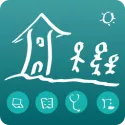GNU Health is a libre digital health ecosystem that provides the tools for individuals, health professionals, institutions and governments to proactively assess and improve the underlying determinants of health, from the socioeconomic agents to the molecular basis of disease. From primary health care to precision medicine.
GNU Health is a Libre, community driven project from GNU Solidario, a non-profit humanitarian organization focused on Social Medicine. Our project has been adopted by multilateral organizations to national public health systems around the world.
The following are the main components that make up the GNU Health ecosystem:
- Hospital Management (HMIS):
GNU Health HMIS component for Health Practitioners, Health Institutions and Governments.
Its modular design allows to be deployed in many different scenarios: from small private offices, to large, national public health systems. It covers the functionality of Electronic Medical Record (EMR), Hospital Management and Health Information System (HIS).
GNU Health HMIS component is standard-based, and it provides over 40 packages/modules (primary care, obstetrics & gynecology, pediatrics, surgery, lims, genetics, diagnostic imaging, reporting...) to fit your institution needs. The GH HMIS combines the socioeconomic determinants of health with state-of-the-art technology in bioinformatics and clinical genetics. It manages the internal processes of a health institution, such as financial management, billing, stock management, pharmacies or labs (LIMS)
-
Laboratory Information System (LIMS)
GNU LIMS, also known as Occhiolino, is a modern Laboratory Information Management System for the healthcare and biomedical sectors, that has emerged as a GNU Health sub-project.
The Laboratory Modules manage the request, creation and evaluation of laboratory analyses. As far as the LIMS (Laboratory Information Management System) functionality, GNU Health is very flexible. You will be able to link it to the patient chart and to the financial management of the Health Center
-
Personal Health Record
MyGNUHealth is the upcoming GH's Personal Health Record application that integrates to the GNU Health Federation, focused on desktop and and mobile devices.
MyGNUHealth development uses the latest mobile and desktop technology, such as Qt, KDE Plasma and the Kirigami framework. MyGNUHealth Personal Health Record is a privacy-oriented PHR, that will put the citizen and the patient in control of her health and medical information. MyGNUHealth will boost and improve the interaction between citizens and the health professionals, with up-to-date information on demographics and medical information.
-
The GNU Health Federation
The GNU Health Federation allows to build large, nation wide federated networks with thousands of heterogeneous nodes. The GNU Health federation is revolutionary, and will provide the community, the health practitioners, the research institutions and the ministries of health to have much better perspective and precise information on the individuals and their context.
The GNU Health Federation project aims to build a community based, federated health network among different regions and in a country, and, why not, among countries around the globe. A federation can be as large as you want. From a small regional federated network with several nodes, to a large, nationwide health network with thousands / millions of participating nodes.
-
Social Medicine
GNU Health as a social movement: GNU Health is a social project with technology behind. It’s about Social Medicine and delivering universal healthcare. It’s about social activism. One of the main reasons that led me to create GNU Health were the tremendous inequalities in access to healthcare. Over 20000 children die every day from preventable, social diseases. To name a few : malnutrition, contaminated water, child slavery, prostitution, war, malaria, HIV-AIDS, tuberculosis, dengue and other neglected tropical diseases. These are causes and/or results of social diseases, conditions that have a higher impact and higher prevalence on the poor and the underprivileged.
Studying and getting a deeper understanding on the living conditions of people in rural areas and in urban ghettos around the world, reinforced my intention to write a system that included the socio-economic determinants of health and disease. Most of the time, health (and the lack of) is determined by the environment, and biology plays a lesser role. Proper nutrition, housing, sanitation, access to education and to primary healthcare are key for the dignity, development and health of the individual, family and society at large. I like to summarize it as “people before patients”

Suriname adopts GNU Health Hospital and Health Information System

Migrar, Migrant, Migràrem: Sea-Eye Rescue missions and GNU Health
GNUHealth HMIS 4.4 released
GNU Health Hospital Management 4.2.1 patchset released




